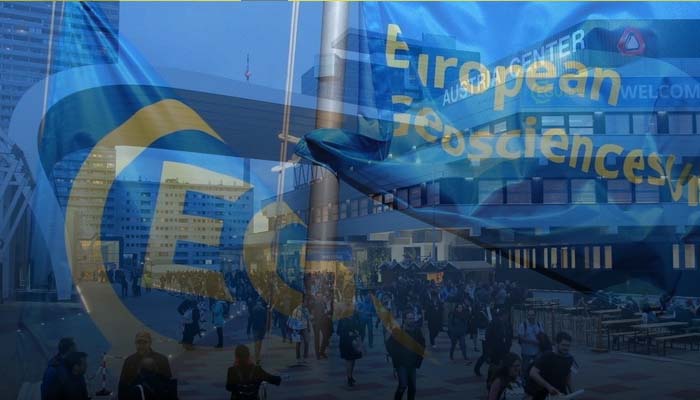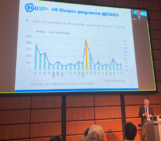
I am finally going back to Vienna this year for the European Geosciences Union (EGU) General Assembly (GA) in April, for the first time since 2019.
Strangely, I am now with this feeling of “finally back ‘home’ at the Austria Center Vienna”. I have been asking myself what is going to be different after these four years, who I will meet there, if the city has changed, which places I want to see again… So many questions! I am so excited that I started already making diner appointments to be sure to meet those who I have not seen for so long. Also, for this ‘fresh re-start’ of an on-site EGU GA, one thing is already set: I will now travel by train to Vienna.
A different means of transportation is not the only novelty I expect this year. After the first-ever fully hybrid EGU meeting in 2022, the hybrid format this year brings back posters and PICOs, offering on-site and virtual presenters the opportunity to share their work and network with their pairs. It will be exciting to navigate through the different orals, posters and PICOs, and to experience how this fully hybrid meeting will promote inclusiveness and foster participation from different counrties and career stages.
Even if this might be challenging for the budget of my research group, I am also encouraging all my PhD students to participate to EGU and come to Vienna, if that is possible for them. Some will be newcomers to the meeting, and that is when I was wondering how to explain the General Assembly (GA) to a newcomer. How to describe that feeling of being overwhelmed by the shear amount of people, posters and presentations and the many science works they will be hearing about, in many cases, for the first time? How to navigate the conference center, its many floors, PICO spots and poster halls? How to go through the programme (in advance!) and to make sure you include in your agenda all the key sessions, short courses, networking events, debates, award ceremonies etc. that will contribute to your work and your well-being as an early career scientist?
The meeting programme is not out yet. Programme Group chairs (see who they are here) and session conveners are currently working hard to get it scheduled (it is expected to be published online by the end of February). However, from my experience, everybody planning to go on-site this year should already book their travel and accommodation. And, of course, do not forget the early registration until 8 March!
If your schedule permits, plan to arrive on Sunday evening (or on Saturday, if you want to visit the beautiful city of Vienna) before the meeting starts, and to stay the whole week. Even if you do not know yet exactly what you will find during the whole week of conference, chances are you will always find a session or an activity that will trigger your curiosity, or someone to talk to in the poster halls or networking areas. One thing is certain: you will not get bored!
Also, if you are planning to attend the meeting online, you should know that a Gather Town experience is being prepared to host virtual posters, PICOs and many networking areas. I am sure you will not be feeling alone online either! The meeting this year is being carefully prepared to prompt many interactions between attendees on-site and online. It will be a new experience for EGU GA. Registration for virtual attendance has also early rates if you register before 8 March. And, what takes the cake (or should I say the “Sacher-torte”!), registration is free for undergraduate or master students, and low- & lower-middle income countries (see conditions here).
So, then, you are ready to attend, what are the next steps now? Keep yourself updated with the latest information. EGU is publishing monthly updates, which you can find in the meeting’s front page, with tips for everybody: conveners, authors and attendees. Once the programme is out, take your time to browse it and select the things you do not want to miss. Then, just keep your mind open to all possibilities and enjoy EGU Science!
Join the Hydrological Sciences Division community:
Twitter: https://twitter.com/EGU_HS, Blog: https://blogs.egu.eu/divisions/hs/, Mailing lists: https://www.egu.eu/hs/home/
Further reading:
https://blogs.egu.eu/divisions/hs/2022/06/22/ecs-looks-back-at-egu/
https://blogs.egu.eu/divisions/hs/2022/06/15/first-hybrid-egu-general-assembly/
https://blogs.egu.eu/divisions/hs/2019/04/17/a-personal-view-on-egu-2019-an-edition-like-no-other/
Header image source: collage based on pictures from https://www.egu.eu/



Telkom University
Where can one find information about the Programme Group chairs and session conveners?
Bettina Schaefli
The subdivision “Hydrology” is explained here, with links to subdivision chairs (called science officers): https://www.egu.eu/hs/about/structure/
Industri Kreatif
How might participating in networking events and workshops benefit early career scientists at such conferences? Greeting : Industri Kreatif